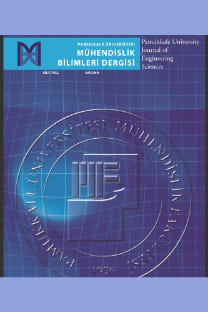Kağıt üretim atığı katkılı yüksek yoğunluklu polietilen (yype) kompozitlerin mekanik özelliklerinin incelenmesi
Yüksek yoğunluklu polietilen, Kağıt üretim atığı, Mekanik özellikler
Investigation of mechanical properties of paper processing residue filled high density polyethylene (hdpe) composites
___
- Pöllanen M, Suvanto M, Pakkanen TT. “Cellulose reinforced high density polyethylene composites-Morphology, mechanical and thermal expansion properties”. Composites Science and Technology, 76, 21-28, 2013.
- Huang HB, Du HH, Wang WH, Shi JY. “Characteristics of Paper Mill Sludge-Wood Fiber-High density polyethylene composites”. Polymer Composites, 33, 1628-1634, 2012.
- Hamzeh Y, Ashori A, Mirzaei B. “Effect of Waste Paper Sludge on the Physico-Mechanical Properties of High density polyethylene-Wood Flour Composites”. Journal of Polymers and the Environment, 19, 120-124, 2011.
- Son J, Kim HJ, Lee PW. “Role of Paper Sludge Particle Size and Extrusion Temperature on Performance of Paper Sludge-Thermoplastic Polymer Composites”. Journal of Applied Polymer Science, 82, 2709-2718, 2001.
- ASTM D3039. “Standard Test Method for Tensile Properties of Polymer Matrix Composite Materials”. ASTM International, West Conshohocken, PA, 2014.
- ASTM D790. “Standard Test Methods for Flexural Properties of Unreinforced and Reinforced Plastics and Electrical İnsulating Materials”. ASTM International, West Conshohocken, PA, 2010.
- Zhao H, Kwak JH, Zhang ZC. Brown HM, Arey BW, Holladay JE. “Studying cellulose fiber structure by SEM, XRD, NMR and acid hydrolysis”. Carbohydrate Polymers, 68(2), 235-241, 2007.
- Kontoyannis Christos G, Nikos V. "Calcium carbonate phase analysis using XRD and FT-Raman spectroscopy". Analyst, 125.2, 251-255, 2000.
- Sakharov BA, Drits VA. "Mixed-layer kaolinite-montmorillonite: A comparison of observed and calculated diffraction patterns”. Clays and Clay Minerals, 21(1), 15-17, 1973.
- Reig FB, Adelantado, JG, Moreno MM. “FTIR quantitative analysis of calcium carbonate (calcite) and silica (quartz) mixtures using the constant ratio method”. Application to Geological Samples, Talanta, 58(4), 811-821, 2002.
- Shahwan T, Zünbül B, Tunusoğlu Ö, Eroğlu AE. “AAS, XRPD, SEM/EDS, and FTIR characterization of Zn 2+ retention by calcite, calcite–kaolinite, and calcite–clinoptilolite minerals”. Journal of Colloid and Interface Science, 286(2), 471-478, 2005.
- Kılınc AC. et al. "Manufacturing and characterization of vine stem reinforced high density polyethylene composites". Composites Part B: Engineering, 91, 267-274, 2016.
- Yang X, Weihong W, Haibing H. "Resistance of paper mill sludge/wood fiber/high‐density polyethylene composites to water immersion and thermotreatment". Journal of Applied Polymer Science, 132(11), 2015.
- Salmah HI, Bakar AA. “A comparative study on the effects of paper sludge and kaolin on properties of polypropylene/ethylene propylene diene terpolymer composites”. Iranian Polymer Journal, 14(8), 705-713, 2005.
- Soucy J, Koubaa A, Migneault S, Riedl B. “The potential of paper mill sludge for wood–plastic composites”. Industrial Crops and Products, 54, 248-256, 2014.
- Cho J, MS, Joshi, CT, Sun. "Effect of inclusion size on mechanical properties of polymeric composites with micro and nano particles". Composites Science and Technology 66(13), 1941-1952, 2016.
- ISSN: 1300-7009
- Başlangıç: 1995
- Yayıncı: PAMUKKALE ÜNİVERSİTESİ
Eren Yılmaz, Azim Gökçe, Fehim Fındık, Hamit Özkan Gülsoy
Lazer destekli imalatta plazma dinamiklerinin teorik ve deneysel olarak araştırılması
Alüminyum alaşımlı jantların tasarım ve ağırlık optimizasyonu
Ali Kara, Halil Emre Çubuklusu, Özgür Yavuz Topçuoğlu, Ömer Burak Çe, Uğur Aybarç, Caner Kalender
Grafen takviyeli alüminyum esaslı kompozitlerin üretimi ve karakterizasyonu
Mahmut Can Şenel, Mevlüt Gürbüz, Erdem Koç
Li-iyon piller için kalay esaslı grafen kompozit anotun yapısal ve elektrokimyasal karakterizasyonu
Miraç Alaf, Gizem Hatipoğlu, Ubeyd Toçoğlu, Hatem Akbulut
Atomik olarak eşit miktarda demir ve krom içeren Fe-Cr ikili alaşımın borlanması
Al-Zn-Mg-Cu alaşımlarının su verme hassasiyeti
Funda Gül Koç, Mustafa Çöl, Tanju Çeliker
